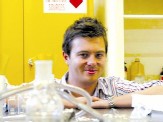
|
Why Postgraduates are Pessimistic: Matt Hall |
The following conScience column

As he prepares to join the brain drain, Matt Hall* asks what will encourage him to return.
After completing their doctorate, aspiring academics are expected to build their research careers by leaving our shores. Indeed, skills brought back from experience gathered overseas do serve to enrich Australian research. The attraction of working abroad is the prospect of greater funds available to allow high quality research, along with a broadening of one’s horizons. This is especially the case in the USA, Canada, the UK and Europe.
Returning to Australia is what most academics desire, although this can prove difficult. An Australian academic whose group I worked with in Oxford last year was “stuck” there, unable to return, because of inadequate support for his research. While Federation Fellowships are now starting to redress this issue to some extent, there is a large gap between this scheme and the qualifications a postdoc can expect to possess.
I am one of 30,000 PhD students in all disciplines in Australia. How many of us are going to be able to allow the nation to realise fully the investment made in our research training?
We postgraduates do not perceive the general outlook for universities in a positive light, and the attitude of the government towards funding is frustrating. Everyone associated with tertiary education anticipates with trepidation Dr Brendan Nelson¹s reform package, which is due in the May budget.
The difficulty of convincing the Federal government to raise university funding to “appropriate” levels is well known. The Australian Vice-Chancellors Committee says that an immediate increase of $1 billion per year is required.
But research is only one role played by academics. Government figures reveal a 22% increase in class sizes from 1996 to 2002 while full-time-equivalent teaching staff remained static during this time. There seems little encouragement for people to enter a scientific career in Australia.
As president of a postgraduate association involved in representing students and developing policy, I encounter daily the difficulties facing researchers and teachers. Budget cuts, the perceived inequity in the Research Training Scheme and the ever-increasing teaching load constantly remind us of the reality of an uninviting career in academia.
These comments are made from the best-performing research university in Australia. Postgraduates at many other universities fare worse. In a recent statement the Council of Australian Postgraduate Associations suggested that “we’re hearing the last gasps of quality tertiary education in Australia”.
At a personal level, my research is focused on explaining how anticancer drugs work. To this end I am a “suitcase scientist” who travels overseas regularly to use synchrotrons in Japan and the USA as there are none in Australia. Synchrotrons are powerful X-ray sources that are useful in a wide range of research and commercial applications, including drug discovery, crystallography and nanotechnology.
Construction has just begun in Victoria on Australia’s first synchrotron, a $200 million facility that reflects a growing realisation that we need to show long-term commitment to reap benefits for the nation, although this thinking appears to predominate at a state level. There will be spin-off benefits too, such as the fostering of corporations around large research infrastructure.
Matt Hall can be contacted at the Sydney University Postgraduate Representative Association (02) 9351 3715 or (0412) 751 681.